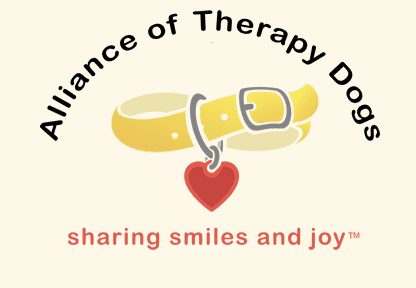
RESOURCES
Below are valuable resources on Emotional Support Animals, Therapy Animals, and the human-animal connection. Also, take a look at our features in the media.
SUPPORTING ARTICLES & PODCASTS
-
![]()
Playing with dogs helps people concentrate and relax, brain recordings show
In a study of brain activity, walking a poodle made people more relaxed, brushing the dog improved concentration, and playing with her had both effects.
-
![]()
Pets at Heart: Emotional Support Animals
Sometimes there are no words. Sometimes the feelings are too big, or complex, or contradictory to share with another person.
-
![]()
The Role of Pet Ownership in Management of Mental Health
A common challenge for those managing a long-term condition or mental health problem is the ability to manage and be engaged with everyday life, referred to as ontological security.
-
![]()
The Health Care Cost Savings of Pet Ownership
The academic and professional literature recognizing the link between pet ownership and improved health conditions continues to grow in depth and breadth.
-
![]()
The Pet Effect
HABRI has assembled scientific evidence that demonstrates how pets improve heart health; alleviate depression; increase well-being; support child health and development; and contribute to healthy aging.
-
![]()
Mental Health and Well-Being
Pet dogs have a notable impact in the lives of children, including the management of their mental health.
-
![]()
Everything You Need to Know About Emotional Support Animals
Every dog owner knows there are many benefits to having a dog, from getting themselves out for exercise to receiving loyal companionship. However, for some people with mental or emotional conditions, the presence of a dog is critical to their ability to function normally on a daily basis.
-
![]()
PAWS FOR PATRICK-Emotional Support Animals and Mental Health
Over 5 million young people suffer from mental illness in the United States (CDC, 2022). There are a number of treatments out there to help with any mental health concerns- therapy, medication, rehabilitation, the list goes on. Paws for Patrick takes pride in their animals.
-
![]()
10 Ways Pets Support Mental Health
The bonds between humans and animals are powerful. And the positive correlation between pets and mental health is undeniable.
-
![]()
Pawsitive Impact: Introducing a Therapy Dog to LFHS
Twice a year during finals week, students enjoy love and affection from dogs that the Paws For Patrick organization brings to the school. This can be an escape from the sea of stress and anxiety experienced by many students during finals week.
-
![]()
The Amazing Benefits of Therapy Dogs
Therapy animals are a great way to improve the mental health of those who interact with them.
-
![]()
Therapy Animals – Offering Comfort and Cheer to People in Need
Animals have been known to offer humans companionship since ages.
-
![]()
Confirming the benefits of emotional support animals
Have you received a telephone call of the following nature? “Can you certify my pet to be an emotional support animal?”
-
![]()
The power of support from companion animals for people living with mental health problems: a systematic review and narrative synthesis of the evidence
There is increasing recognition of the therapeutic function pets can play in relation to mental health.
-
![]()
Medical Monday's
We talk about emotional support animals.
-
![]()
The Record North Shore
A loving listener, a curious conversationalist, an authentic artist, a wonderful wrestler, and an animal admirer is how family, friends, and loved ones remember Patrick Roemer, an 18-year-old Lake Forest High School student who died by suicide in May 2020.
-
![]()
The Local Moms Network
This month we are spotlighting Paws for Patrick, a brand new local nonprofit dedicated to connecting young people with emotional support animals to aid them as they live with mental illness.
-
![]()
The Winnetka Park District
During the month of May, the Park District and Paws for Patrick encourage everyone to help “Turn Our Towns Green” to raise awareness for Mental Health Awareness Month.
-
![]()
Freedom Homecare and Medical Staffing
In May, over 22 communities, led by Paws For Patrick, collected donations and put up signs or ribbons all over in solidarity with Mental Health Awareness Month. Schools, businesses, and homes all showed their support.
-
![]()
No Shame on U
Sometimes there are no words. Sometimes there is a pain inside and to try to answer “What’s wrong?” seems pointless and absurd.
-
![]()
Charities2Love
WHAT THEY DO
Connect young people (up to 26 years old) with Emotional Support Animals (ESAs) & Therapy Dogs to aid them as they live with mental illness.
-
![]()
The Forest Scout
Man’s best friend does not fully define nor do justice to describe what a dog means to its owner. Regardless of size or breed, all dogs provide two unique, one-of-a-kind values to their human companions: love and comfort.
-
![]()
Law enforcement leaders eye therapy dogs as potential boost to officer mental health
Joel Gordils said he was a step away from killing himself when he heard the click of his dog’s toenails on the floor.
-
![]()
How to Register Your Dog as an Emotional Support Animal
Emotional support animals (ESAs), like dogs, are becoming more common in the U.S.—and for good reason! Research shows ESAs can help with depression, anxiety, and give you a new purpose in life, says Daniel Maigler, a licensed clinical social worker and mental health advisor at Paws for Patrick.
PAWS FOR PATRICK IN THE MEDIA
-
![]()
Mental Health Talk Magazine
In a world where mental illness continues to affect young people, the CDC (2023) reported that in 2021, 14.9% of children aged 5–17 years in the United States received mental health treatment in the past 12 months. mentalhealthtalk.live/pages/magazine
-
![]()
The Social Work Bubble Podcast
On this episode of The Social Work Bubble Podcast, we speak with Daniel Maigler, LCSW & mental health advisor of Paws for Patrick. Dan gives incredible insight on emotional support animals, how therapists can screen for & write ESA letters & more!
-
![]()
PiZetta Media: Content with a Cause
How Emotional Support Animals Change Lives: Dan Maigler’s Mental Health Mission
-
![]()
Morgan's Message & The Mental Matchup
Dan Maigler and Mags Roemer join Kat on The Mental Matchup. Dan and Mags both work for Paws for Patrick, a non-profit organization connecting young people with Emotional Support Animals and therapy dogs to help with their mental health.
-
![]()
Pet Parents Place
It’s a tale as old as time, the human-animal bond. From ancient times to the modern era, humans and animals have shared a connection that has shaped cultures, enriched lives, and taught us lessons about compassion, empathy, and companionship.
-
![]()
You Learn Youturn
Fronzie and Mags Roemer are turning grief into action, and with their fierce determination are hoping to give emotional support animals to anyone struggling with a mental health issue.
-
![]()
HOPEfull Conversations
HOPEfull Conversations, Magdelene (Mags) Roemer joins Kari to discuss the connecting young people to Emotional Support Animals (ESA) and Therapy Dogs to aid them as they live with mental illness through the work of Paws For Patrick where she serves as the Junior Board Chair.
-
![]()
Rescued by a Dog
Pup Cici teaches a bereaved young woman to change the world
-
![]()
Social Workers, Rise!
We talk about emotional support animals, psychiatric service animals, and facility animals. Learn about their unique roles and how they make a difference in people's lives.
-
![]()
The Tragedy Academy Podcast
Discover the incredible impact that pets can have on people’s lives, providing structure, love, and even little mental breaks to recharge!
-
![]()
Mental Health Mondays with Marla and Dave
Fronzie and Mags Roemer. Fronzie is the founder of Paws For Patrick, non-profit organization dedicated to connecting young people to Emotional Support Animals and Therapy Dogs to aid them as they live with mental illness.
-
![]()
The Leftover Pieces; Suicide Loss Conversations
Movement, Signs & the Love of a Dog; A Mom Living Forward after Suicide Losstion goes here
-
![]()
NBC Evening News
‘Paws for Patrick' Finds Emotional Support Animals for People with Mental Illness
-
![]()
WGN9
Family honors loved one’s memory by connecting pets to those who are struggling
-
![]()
Catholic Sports Radio
“There’s … no reason why we can’t treat each other respectfully. There’s no reason why there has to be trash talk. There’s no reason why our victory has to be someone else’s loss.”
-
![]()
WGN9
Paws For Patrick
-
![]()
The Community Cats Podcast
Stacy chats with Daniel Maigler, a licensed clinical social worker, who also serves as the Mental Health Advisor for Paws for Patrick, which is a nonprofit organization that connects young people with mental health issues to animals.
-
![]()
Real Men Feel
Dan Maigler, shares his journey from politics to lobbying, to counseling, always knowing he wanted to help people.
ESA REQUEST
ESA REQUEST
Please fill out the form to give us an idea of how we can help you. This form can be used for those individuals who are looking for help with an ESA letter, adopting an ESA, or simply getting training for your current animal. We can help with any or all of the above.










































